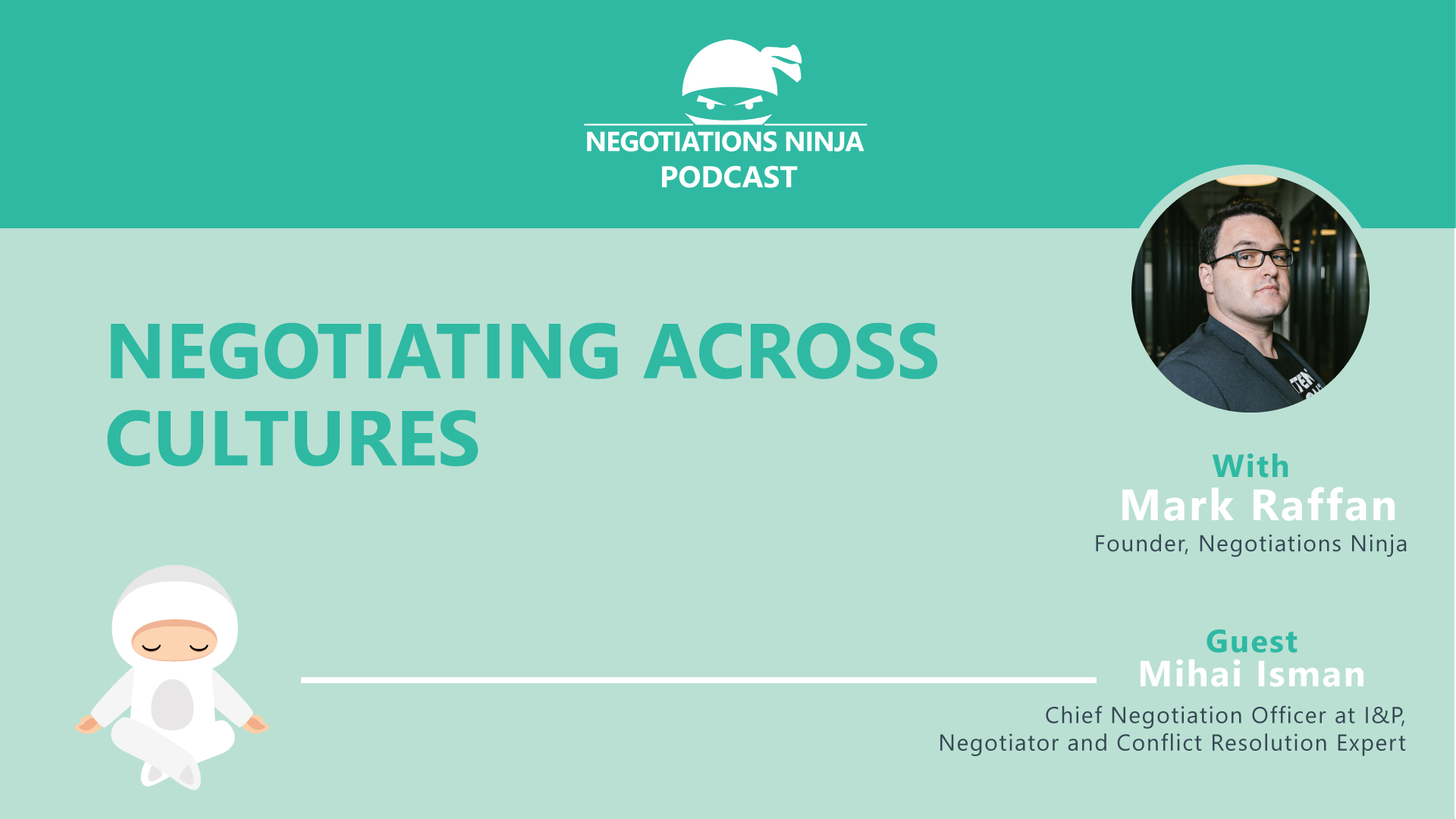Negotiating across cultures adds a level of complexity to the negotiations process that many people don’t take seriously enough. There will inevitably be beliefs, mindsets, concepts, and even seemingly simple words and phrases that are understood differently, making this type of negotiation difficult at best. The opportunity to learn from those who are in the trenches of international negotiation regularly is priceless, especially when the subject of our study is someone who consistently does this kind of negotiation well.
My guest on this episode is one of those people, International negotiator and trainer Mihai Isman. He is a negotiation and conflict resolution expert who specializes in addressing difficult but important efficiency barriers for national and international corporations and medium-sized companies. His keen insight into the differences between Western and European negotiators, their cultures, and consequently their approaches is something all of us can learn from. Be sure you listen carefully.
Outline of This Episode
- [1:35] Mihai’s background as a negotiator and trainer and the ideas behind this episode
- [3:33] Differences in negotiations styles between North Americans and Europeans
- [6:05] The importance of mindset in any negotiation
- [9:40] Why many people shy away from the conflict necessary in negotiation
- [12:25] Discussing the concept of “fairness” with executives, and the pushback received
- [19:49] One piece of advice for all negotiators, no matter their country or culture
There are clear differences when negotiating across cultures
The cultural background from which you come dictates the way you view things like conflict and cooperation. It’s a given and should be expected when negotiating cross culturally. These differences can also impact the way you go about preparing for negotiations. Extra care and diligence will be required.
When Mihai was asked about the differences he sees between North American and European negotiators, he pointed first to differing approaches to preparation. He says that those from Europe are good with the facts and data pertaining to the negotiation. Those in the West also place emphasis there but in addition, tend to do a better job preparing for dealing with their counterpart(s) in the negotiation. This means they dig into the person’s background, expertise to better understand who they will be negotiating with.
Another difference he sees is that negotiators from Europe will often present their ideal desired outcome right upfront. In doing so they inadvertently put themselves at a disadvantage because they wind up with no ability to make concessions of any kind. This often results in them being perceived as not being willing to compromise, but the fact is that they didn’t allow themselves room to adapt to the needs of the negotiation.
Cultural differences bring with them different mindsets about negotiation
Mihai believes that the mindset of each negotiator at the table impacts the outcome more than perhaps anything else. How they think about what is going on and what the desired outcome is to be will shape the way they approach and carry out the negotiation. One of the areas where mindset has a significant impact is in how each negotiator thinks about their counterpart in the negotiation. Western and European negotiators often have very different views in this realm.
For example, does each negotiator view the person across the table as an adversary or as a negotiation partner with whom mutual goals can be explored and even attained? Listen to hear Mihai describe an exercise he often conducts with his executive coaching clients. It reveals what they believe in this regard and demonstrates options they hadn’t considered..
5 negotiation strategies that apply across all cultures
Mihai has studied both the skills behind effective negotiation and many of the best examples of negotiators in business and politics throughout history and across the world. During our conversation, he explained that there are 5 negotiation strategies that every negotiator needs to understand and master.
- Confrontation
- Cooperation
- Compromise
- Avoidance
- Accommodation
The difficulty is not in understanding the basics of what each of these approaches entails but rather in knowing when to apply each and how any one of them may tie into the others, or preclude them. Commenting on these strategies, Mihai shared how confrontation is necessary in all negotiations and how it can lead to both cooperation and compromise. Don’t miss it.
All negotiations must provoke a confrontation
One of the most difficult aspects of negotiating across cultures is that certain aspects of good negotiation may be resisted or looked down upon in some cultures. Mihai points out that European cultures tend to avoid confrontation, which turns out to be unfortunate when it comes to negotiation because negotiation by necessity involves conflict.
Some negotiators misunderstand the role conflict plays in negotiation. The reality is that conflict is more about communicating with clarity than it is combativeness or competition. For example: When you are at the negotiation table you must be clear about what you are able to negotiate and what things are entirely off the table. As another example, you need to clearly articulate your negotiation framework, which includes what decisions you have the authority to make and what things you cannot decide on your own. This clarity outlines the conflict that the two sides of the negotiation are coming together to negotiate and serves as the basis for moving forward.
The observations Mihai makes about negotiating across cultures provide lessons for all of us. Listen to glean from Mihai’s experience with clients, companies, and governments.
Resources & People Mentioned
Get a Free Ticket to the Spark Event in February at:
Website: ScoutRFP
Ticket Code: ninja2020
Connect with Mihai Isman
- Isman’s corporate website: https://www.ismanundpartner.com/
- Connect with Miahi on LinkedIn
Connect With Mark
- Follow Negotiations Ninja on Twitter: @NegotiationPod
- Connect with Mark on LinkedIn
- Follow Negotiations Ninja on LinkedIn
- Connect on Instagram: @NegotiationPod




